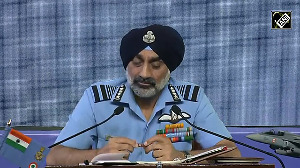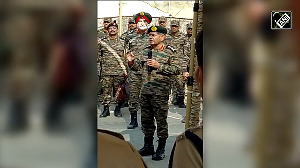"The deal in the Congress is going to have a galvanizing effect on the NSG. I suspect strongly that some countries are just waiting to see whether or not the United States will fully commit itself to the deal," Under Secretary of State for Political Affairs Nicholas Burns told a group of Indian journalists in a teleconference in Washington, DC.
"Both President Bush and both Houses of Congress and both political parties, it is a very powerful message to the NSG countries that the US is going to push very hard for India and be India's champion at the NSG. That's the message we are getting out to all the countries that sit on the NSG," he said.
Bush is going to sign the legislation into law next Monday.
Expressing confidence that India's South Asian neighbour China would not be trying to block the landmark deal, Burns said Beijing understood the wisdom of the pact.
"I would be very surprised if China tried to block the deal. I don't think it will. I think China understands how strategically important India is, the wisdom of this arrangement and I have never heard from Chinese officials that they tend to block this," he emphasised.
Burns said even before hammering out the legislation, the Bush administration had the support of majority of the countries that sat on the NSG.
"Even before the deal I think we had the majority of the countries to support. Now I think we will be successful in getting some of the others to come along. I was in Paris and Brussels before I went to India and I talked to many, many of the European countries. I talked to the Swedes, the Finns, the Norwegians, the Danes about this," Burns said.
Stressing that the US is going to meet all commitments it has made to India, the senior official said, "I want to say how pleased we are at the reception that the civil nuclear agreement has received in India."
"We know that Foreign Minister Pranab Mukherjee has spoken in the Parliament and we are convinced on the basis of my trip and my discussion with the Indian leadership that this is the right way forward," he said.
"I was able to communicate to the Indian government on behalf of Secretary of State Condoleezza Rice and President Bush that the US is going to meet all the commitments it made to India in both the July 2005 Joint Statement and in the March 2006 Joint Statement," the senior State Department official said.
"We are now very optimistic that the Congress having taken this action, the Indian government having decided that it is one wishes to go forward, we have now cleared the major hurdles," Burns said.
He termed the Congress passage of the reconciled legislation to implement the nuclear deal a "...very positive moment in the history of US-India relations going all the way back to 1947."
"This is one of the biggest breakthroughs we have had and I can tell you there is a great deal of optimism in my government about the way forward," he said.
Burns stressed that the Conference Report of the House of Representatives and the Senate on the civilian nuclear deal had taken into account and addressed the concerns raised by India.
"Our view is that the actions of the Congress within the conference last week were fully commensurate and well within the parameters of the two Joint Statements of 2005 and 2006.
"The Congress did make a number of adjustments that we think did deal in large part with some of the objections which India had registered and we are very grateful to the Congress for its leadership," the senior official said.
"The way the Congress ended up in the Conference Report is a deal that is acceptable to the United States; and I understand it is acceptable to India. That is what the Indian government told me in the private meetings and that is essentially what I understood from Foreign Minister Mukherjee's statements in the Parliament as well," he said.
Burns noted that the United States has left behind a draft proposal for the conclusion of the so-called 123 Agreement and is keen on pushing the process on an expedited fashion.
"The United States has left with the Indian government a draft agreement and we are waiting for the Indian government to respond and I am sure it will quickly," he said.
The senior administration official also rejected as "erroneous" reports that the Left parties in India had refused to sit down with him to discuss the civilian nuclear deal.
"I don't believe so. I was not aware that they had decided not to meet with me and I didn't seek a meeting with the left parties. That is erroneous actually," Burns maintained.





